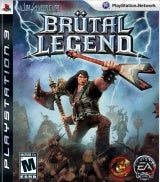We took a few minutes to talk about Comic-Con, the inspirations for Brutal Legend, licensed music, and more.
GameSpy: So, Tim Schafer...
Tim Schafer, Game Designer, Founder, Double Fine Productions: Tim Schafer.GameSpy: Let's talk about Brutal Legend...
Tim Schafer: Brutal Legend.GameSpy: Comic-Con is home to movies, comics, television, and now videogames; the biggest pop-culture event around. Is Brutal Legend made for Comic-Con?
Tim Schafer: It's perfect for Comic-Con in that it's a fantasy world, it's new, it's original, not derived from anything existing. It's funny, and it's bloody... and it's got ladies in it.
There seems to be a reason that Hollywood has descended upon Comic-Con. There are a lot of original ideas here. So if it's a place for original ideas, then I think Brutal Legend belongs there.
GameSpy: The show has increasingly become about Hollywood. Do you feel like it should be more about the comics?
Tim Schafer: I always wonder if people that have been coming here for years feel that way. At some point in the past it must have just been bins of comics, right? When was the first time you've been here?GameSpy: I went to my first Comic-Con six years ago, and it's been getting bigger and bigger every year.
Tim Schafer: I never hear anyone say, "Oh, it's ruined now!" Everyone seems to enjoy the movie and television stuff that's arrived. Maybe that's just because of the cool movies and television shows you see there, like "Lost" and "X-Men." It's because the event is so fan-driven, you always see stuff that just resonates with people.GameSpy: Update us on Brutal Legend's development. Where is it at now?
That's the kind of connection that I've always hoped to have with the games. So that people on a personal level will be like, "that's my favorite game." It's not like they're designed with a graph that says, "It's got to have these features." Mostly, it's about something heartfelt from the creative team, and I think people pick up on that, and I think that's how you build the personal connections.
Tim Schafer: We're just about done! We're polishing, finishing off some tweaks and bugs. Keeping it looking cool and running fast and getting the difficulty just right. We have a lot of different characters in the game and they all have different methods of fighting, so getting the difficulty just right is its own science. We just finally locked down the soundtrack last week, and we're going to announce that in the coming weeks, possibly next week.GameSpy: What has that process been like?
Tim Schafer: It's been very interesting, because we've been trying to lock down our licensed music list for at least two years. I think there's a team of four people at EA who have been running around and trying to get a hold of all these bands. Because we want to have a lot of bands that represent the full spectrum of music, from hard rock to heavy metal. Some of the stuff people will know very, very well, while some of the stuff is a little more obscure, that only a real metal fan will know about.GameSpy: Do you find that the rise in popularity of games like Rock Band and Guitar Hero have made it easier to license music for videogames? Are artists more accepting of videogames now that the music/rhythm genre has blown up?
Just finding some of these bands if they're still around is tough. Well, the drummer is fighting with the singer, and the drummer may want to license the songs, but the singer doesn't, you know, a lot of crazy battles like that. Then we got some big rock star demands, like "if you have this guy in your game, then I want double the money." I had no idea it was all so complicated.
Tim Schafer: Maybe, maybe. I mean, the last time I tried to license music was in 1995; it was Full Throttle. I was trying to get Soundgarden in the game, and there were a bunch of bands who were offering stuff. The record labels were like, "why don't you put these songs in the game for free?" They offered us the whole Clash soundtrack, the whole Velvet Underground soundtrack. I was like, "Wow, I love the Clash, I love Velvet Underground, but it's not right for this biker, necessarily, this Full Throttle heavy metal thing."GameSpy: Brutal Legend's development has been pretty eventful, and it strikes me as the kind of game that was made for a developer commentary track.
And they were going to give us their entire catalog for free, because they saw it as a promotional thing. We were just promoting the things they were actually selling, which are the albums. Nowadays, they're like, "we don't really sell albums anymore, and we don't really know exactly where we're going to make money..." so they really want to make money off of us. I think they see things like Rock Band and videogames as another way to sell songs to the consumers.
Tim Schafer: [laughs] I'd enjoy it. You work hard on it, the whole team works really hard on it, everyone gets to put their own piece in it, so when you're traveling through it you can kind of see the tree you made, who built what, how it's layered over time. By the end, the game will take four years to make, so it's this world that we've lived in for so long.
Every hill that's been in it you can recognize, like a hill in your own home town that you've driven past a million times, and it changes, and you remember when it was just a little mound, and now it's a big hill, and now it's got grass on it, and you kind of get to know it. A commentary track would be a great way to tell that story.





